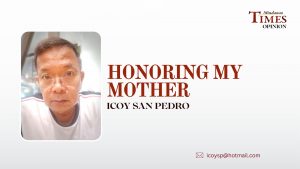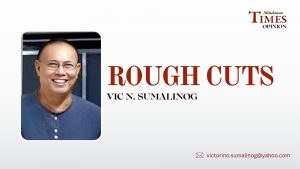BY JOHN ROWNICK LACIDA
ARTICLE II, Section 1 of the 1987 Philippine Constitution states: “The Philippines is a democratic and republican state. Sovereignty resides in the people, and all government authority emanates from them.” This provision embodies the fundamental principle that our government is one that is ordained by the people, derived from the people, and exists for the welfare of the people. It upholds the ideal of a government of laws, not of men, the core political creed of our nation.
One of the essential features of a democratic and republican state is suffrage. Suffrage is not only a political right but also a civic duty, the right and responsibility of every citizen to participate in the election of public officials. Through voting, the people temporarily entrust certain individuals with the authority to govern and to represent their interests.
During the campaign period, aspiring candidates are expected to reach out to the people. They are tasked to present their qualifications, vision for the community, and their commitment to integrity and public service. Candidates hold rallies, debates, and community meetings to communicate their platforms and listen to the concerns of their constituents.
Ideally, they should present specific, realistic, and achievable programs or legislative agendas. However, many candidates fall short of these expectations. Instead of focusing on honest and ethical campaigning, some resort to inhumane and unethical tactics that reveal their lust for power rather than a desire to serve.
Their actions betray the very foundation of public service and often come at the expense of the Filipino people, because when governance is driven by ambition rather than duty, it is always the citizens who suffer the most.
There are three critical issues commonly seen during election seasons. First, there is an overwhelming presence of campaign paraphernalia—tarpaulins, posters, and social media ads—compared to actual platforms.
This disparity raises an important question: Why are these individuals running for office in the first place? The alleviation of poverty should be a top priority, yet many candidates fail to present concrete solutions for urgent social problems such as lack of income, poor access to education, inadequate healthcare, unemployment, and social inequality.
Candidates must go beyond empty promises. They must articulate what laws or ordinances they plan to pass to address these systemic issues. They must explain how they intend to allocate resources, such as the Local Development Fund, and how they will coordinate with national government programs to turn their proposals into reality.
But instead of answering these vital questions, we are met with a sea of smiling faces on posters and slogans that offer little substance. Again, this is done at the expense of the Filipino people.
Second, personal attacks or black propaganda against other candidates. One of the most damaging and unethical practices during campaign periods is the use of personal attacks and black propaganda. These tactics involve spreading false or exaggerated information to tarnish a rival candidate’s reputation, often focusing on their personal life, family, or past controversies, regardless of relevance to their public service record.
Instead of engaging in intelligent discourse or promoting platforms and solutions, candidates resort to character assassination to divert attention and manipulate public perception. This not only undermines the integrity of the electoral process but also discourages qualified individuals from running for office, fearing harassment and misinformation.
More importantly, it deprives the voters of the opportunity to make informed decisions based on real issues and policy debates. Responsible candidates must resist these divisive tactics and instead commit to a campaign centered on facts, vision, and respect, because a leadership built on lies and hate can never produce genuine change. In a democracy, elections must be won through merit, not manipulation. But again, with all this at the expense of the Filipino people.
Lastly, the weaponization of ayuda funds or financial aid. One of the most exploitative and undemocratic practices during election season is the weaponization of ayuda funds—the misuse of government financial assistance as a political tool by certain candidates or incumbent officials.
What should be a neutral, humanitarian act becomes a tactic to manipulate public sentiment and secure votes.
Rather than distributing aid fairly and based on legitimate need, some politicians twist the system for their own gain. They manipulate the release of cash assistance from agencies like the DSWD, local social welfare offices, or even calamity relief funds to favor loyal supporters or coerce voters into political submission. This includes delaying the disbursement of aid until campaign periods, branding relief goods with their faces or names, and even threatening that recipients will lose access to future assistance if they vote for opposing candidates.
These actions are nothing short of political blackmail. They prey on the desperation of the poor, using poverty as a tool for control. They transform a sacred civic moment into a transactional exchange: Vote for me, or lose your only hope for survival. The true danger lies in how this practice undermines democratic choice.
For many Filipinos struggling to feed their families or recover from disaster, elections no longer represent an opportunity to choose the best leader but a desperate decision of survival. This turns democracy into a contest of coerced loyalty rather than a fair and informed evaluation of platforms or leadership capacity. Worse, it exacerbates social inequality by denying aid to those who need it most, simply because they refuse to submit to political pressure.
At its core, this is vote-buying disguised as public service, a gross violation of both election laws and the principles of justice and equality.
This is not what democracy should look like. This is what happens when ayuda is no longer about genuine help but about gathering crowds and building political capital. If real help were the goal, there would be no need for rallies or grand announcements. Aid could be distributed quietly, efficiently, and respectfully at designated DSWD offices, organized, scheduled, and administered with dignity. Instead, the poor are forced to line up under the scorching sun, treated not as citizens with rights but as beggars seeking favors.
What should be a right becomes a humiliating performance. What should be public service becomes personal propaganda. This system does not serve the people. It serves only those in power, using public funds to glorify their names and preserve their positions. If this continues, the ayuda system will remain what it has tragically become: not a lifeline, but a leash, tightening around the necks of the very people it was meant to uplift. In the end, it will always be at the expense of the Filipino people.
The essence of democracy, as enshrined in Article II, Section 1 of the 1987 Philippine Constitution, is rooted in the sovereign will of the people and the ethical exercise of power through public trust. However, the recurring malpractices during election seasons, ranging from superficial campaigns and character assassinations to the politicization of financial aid, gravely undermine the ideals of democratic governance. These actions distort the electoral process, weaken public institutions, and betray the very citizens whom leaders are meant to serve.
When candidacies are driven by ambition rather than accountability, and when public resources are weaponized for political gain, the democratic process becomes hollow, reducing civic participation to a manipulated transaction rather than a meaningful choice. Genuine leadership must rise above deceit and opportunism, anchoring itself in integrity, transparency, and a deep commitment to the people’s welfare. Only then can the Philippine democratic aspiration fulfill its promise, not at the expense, but in the service of the Filipino people.
_____________________________________________________________
John Rownick Lacida is a AB-Political Science student at the University of Cebu – Main Campus. The article is written as part of their school requirement.


